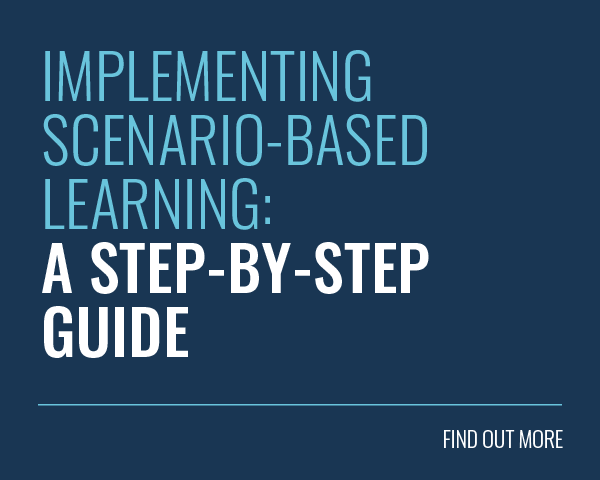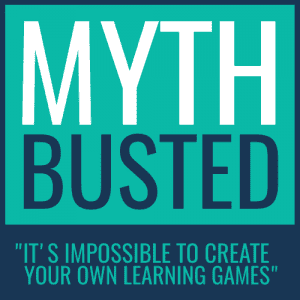 Do you want to use learning games to train your staff? You’ve seen that game-based learning can be effective, but how do you get yourself some of that serious game action? You might think that learning games are out of your reach, but there are several options available for building a game-based learning solution.
Do you want to use learning games to train your staff? You’ve seen that game-based learning can be effective, but how do you get yourself some of that serious game action? You might think that learning games are out of your reach, but there are several options available for building a game-based learning solution.
Before you begin, clarify the goal you want to achieve. If you don’t know what problem you’re trying to solve, you run the risk of using learning games for the sake of using learning games.
There are different types of learning game available and which one you go for will depend on your budget, how much time you’re prepared to devote to the project and whether the particular solution can deliver what you need to address your goals.
[us_separator type=”default” icon=”fas|star”]
 Hire a developer
Hire a developer
If you’ve got big ideas (and big pockets), and you know exactly what you want, there’s a game developer out there who’s just waiting for your call. A game developer will be able to guide you through the process of nailing down the perfect learning game for your company.
Custom development like this doesn’t come cheap, averaging at around $20,000 (£14K) to $30,000 (£21K) for a 15-minute, entry-level game, but this can easily go up as far as $250,000 (£176K). Similarly, for more complex learning games, you can expect a longer lead time.
[us_separator type=”default” icon=”fas|star”]
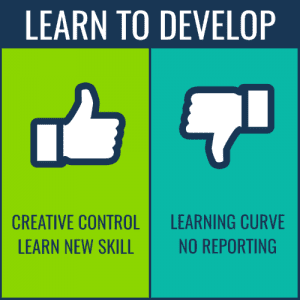 Learn to Develop Games yourself
Learn to Develop Games yourself
If you’ve truly been bitten by the learning game bug and you want to see your ideas come to life, why not teach yourself some game development? People with no prior developing experience have created commercially successful games using applications like GameMaker Studio. If you go down this route, you’ll not only have complete creative control over the project, but you’ll acquire a new skill to boot!
On the downside, even simplified developing engines like GameMaker Studio come with a fairly steep learning curve. There are plenty of tutorials and discussion forums online, but even then, you’ll need to be prepared to invest a lot of time into the project. On a more practical note, you’ll also sacrifice the ability to report on your learners’ progress.
[us_separator type=”default” icon=”fas|star”]
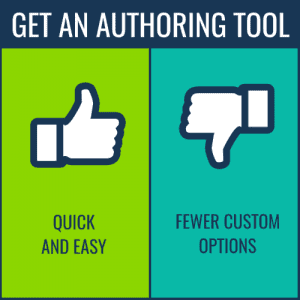 Get an Authoring tool
Get an Authoring tool
A game-based authoring tool addresses the needs of trigger-happy gamers and learning managers alike. With the right application, you can collaborate with your team, add assets, create questions and build these into an engaging game template. If you’re looking for a quick and easy learning game solution, this might be the one for you.
What you gain in convenience, however, you will lose in custom options. The game templates, though engaging, won’t necessarily match your brand perfectly, although many authoring tool providers will develop custom templates at an additional charge.
[us_separator type=”default” icon=”fas|star”]
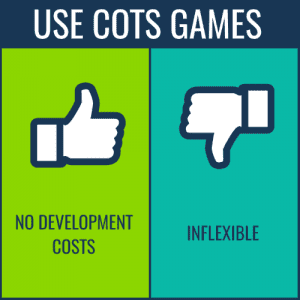 Use COTS games
Use COTS games
Have you considered the possibility of using commercial off-the shelf games? Research has uncovered successes using games that weren’t designed for training purposes. Games like SimCity teach skills like resource management and reinforce the notion that all processes in a system affect each other.
With a little imagination, you can adapt the training to make the best use of these games’ functionalities but the functionalities themselves can’t be changed.
[us_separator type=”default” icon=”fas|star”]
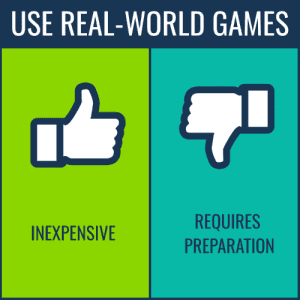 Use Real World games
Use Real World games
Learning Games don’t necessarily require technology – the point is to make the learning activity more interactive, thus securing the learners’ engagement. Role playing, competitions and puzzle solving can all be integrated into classroom sessions to make them more interesting and to encourage participation – and they probably won’t cost you a penny!
The main downside is that they require a lot more coordination. This is a handy solution if you already have training sessions planned, but organising a real-world learning game from scratch can require more planning than you might think.
[us_separator type=”default” icon=”fas|star”]
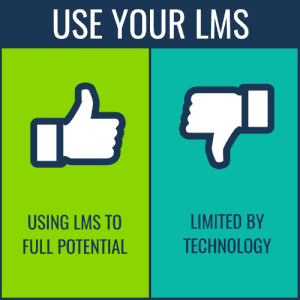 Send Challenges on your LMS
Send Challenges on your LMS
Finally, why not examine the technology you already have at your disposal? Most LMSs will have an in-built testing functionality. You can use this to push quizzes to your learners on a regular basis and, if your LMS is gamified, you can give special badges for these quiz exercises. You could roll a quiz out every Friday and track the results on a league table or on the LMS’s leaderboard.
Turning your learning management system into a game is a lot easier if it’s already gamified, but if you’re not that lucky, you’ll face a bigger challenge. That doesn’t mean that it’s impossible to make a game of a non-gamified LMS, it just means that you’ll need to be more creative!
[us_separator type=”default” icon=”fas|star”]
So there you have it – 6 different approaches to unleashing the power of game-based learning! At Growth Engineering, it’s our mission to reconnect learners to their training by making it more fun. If you want to know more, check out our gamification page, have a look around our blog or, if you’ve got a question, get in touch here!




